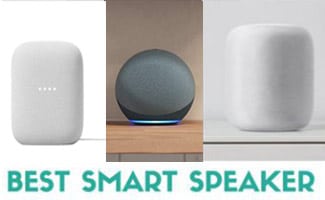Smart Home Privacy Concerns: Secure Your Phone, Speaker, TV, Thermostat & Other Devices
When you purchase through links on our site, we may earn a commission. Here’s how it works.
 Are smart home devices invading our privacy? For sure, say most experts. Our smart speakers, TVs, security cameras, thermostats, and any other Internet-enabled device could be spying on us in our own homes.
Are smart home devices invading our privacy? For sure, say most experts. Our smart speakers, TVs, security cameras, thermostats, and any other Internet-enabled device could be spying on us in our own homes.
Because many Internet of Things (IoT) devices have cameras and microphones that are always online, they’re a prime target for hackers. An added threat is that some of these devices collect and share data with the manufacturer and other third parties. But the good news is that there are ways to protect your privacy from your smart gadgets. Our experts run through the steps you can take to protect your home network and various devices.
Article Overview
- Where Do I Start?
- Smart Speakers
- Smart TVs
- Other Smart Devices
- Privacy Concerns Beyond Your Home (Video)
- Making Your Home Even Smarter
Where Do I Start?
Before we give you tips to reduce your privacy risks with specific smart devices, you should understand how to protect your whole home network. This is crucial for anyone using WiFi, but particularly if you have smart devices in your home.
 Your WiFi router is the front door to a smart home, so barricading your router and WiFi account against cybercriminals is key. Here are 5 essential tips to help you strengthen your WiFi privacy.
Your WiFi router is the front door to a smart home, so barricading your router and WiFi account against cybercriminals is key. Here are 5 essential tips to help you strengthen your WiFi privacy.
5 Essentials For WiFi Privacy
- Use WPA2 encryption when you set up Wi-Fi network access on your router. This is the industry standard for web security.
- Change the default router username and password (this is different from your WiFi network password). Hackers probably already know the default names and passwords that come with many IoT products.
- Change your WiFi network password frequently.
- Make sure your router’s firmware is up to date with the latest security patches. Many routers do this automatically. You can find firmware information on the router control panel or the manufacturer’s site.
- Set up a guest network for visitors to your home.
Smart Speakers
 Are Google Home, Siri, and Alexa always listening? By default, they are (unless you disable the microphone, and in some cases even then they will continue listening) — that’s what they’re designed to do. The microphones are on by default – because that’s what the devices need to hear and respond to your requests.
Are Google Home, Siri, and Alexa always listening? By default, they are (unless you disable the microphone, and in some cases even then they will continue listening) — that’s what they’re designed to do. The microphones are on by default – because that’s what the devices need to hear and respond to your requests.
Smart speakers take your commands, compile information on you, and store everything locally and on a server in the cloud. While most companies have privacy policies on how this data is handled, every cloud server in the world is vulnerable to unauthorized access.
There are no guarantees as to who could gain access to your data or what they might do with it.
Another concern about smart speakers is that they can act as hubs to connect multiple smart devices in your home. This can create added points of vulnerability for hackers to break in. A particularly concerning breach would be hackers getting access to security cameras on your network.
7 Essential Steps For Smart Speaker Privacy
Before you even hook up your smart speaker, familiarize yourself with its privacy and security settings. It’s critical to limit the kind of information you give to your smart speaker and to configure your device to minimize privacy vulnerabilities. Here are some tips to help you keep your risks in check.
1. Mute Your Microphone
Muting your microphone when you’re not using your smart speaker is the easiest way to stop it from listening all the time. Some have a physical switch, while you can mute others by voice command.
2. Delete Commands
Deleting your command history erases both local and cloud storage of past recordings. Yes, your device may need to relearn a command or two, but it’s a great way to wipe out any potentially compromising information. Depending on the device, you can delete commands individually, in a specific time frame, or in full.
3. Strengthen Passwords & Use Two-Factor Authentication
Be sure to change default passwords to something complex that doesn’t include your name, date of birth, or other identifying words. Enable two-factor authentication to create an added layer of passcodes.
 4. Deactivate Personalized Features
4. Deactivate Personalized Features
Your voice assistant can help you pay bills, make purchases, and manage other personal information, like contacts and calendars. But this convenience puts you at greater risk. Consider turning off any settings that give you easy access to your personal information to reduce the chance of identity theft.
5. Train Your Speaker For Voice Recognition
You can train your smart speaker to recognize only your unique voice. This can help lock out any unwanted users from using it, but it doesn’t always work.
6. Be Careful With What You Connect
If you’re using your speaker as a hub, be careful with the types of smart devices you connect to your speaker — especially security devices like smart locks and surveillance cameras. You don’t want hackers to be able to say, “Alexa, unlock the door.”
7. Keep Your Speakers Updated
Be sure to update your devices and apps with the latest releases of software and security patches.
Smart TVs
 Your smart TVs could also be compromising your privacy at home because they’re Internet-enabled. Many also have microphones, and some newer TVs have built-in cameras.
Your smart TVs could also be compromising your privacy at home because they’re Internet-enabled. Many also have microphones, and some newer TVs have built-in cameras.
Just before the holiday buying season in 2019, the Portland, Oregon FBI field office published some tips to protect your family from spying eyes through your TV. Here’s 5 steps they recommend you take.
5 Steps For Smart TV Privacy
- Know exactly what features your TV has and how to control them. If you can’t find the manual, do a basic Internet search with your model number and the words “microphone,” “camera,” and “privacy.”
- Check the default security settings — change passwords and see if it’s possible to turn off any data collection on the device.
- Learn how to turn off the microphones and cameras. If you can’t turn off a camera but want to, place an inexpensive webcam cover over the camera eye.
- Investigate whether the manufacturer has released any security updates for the device and install the latest version. Then, keep it up-to-date.
- Examine the privacy policy for the TV manufacturer and the streaming services you use. Find out what data they collect, how they store that data, and what they do with it.
What About Smart Devices Without Cameras Or Microphones?
Your privacy is still at risk from smart devices that don’t have cameras or microphones because they can collect and share data in the background.
When connected to WiFi, any smart device (door locks, light bulbs, etc.) can provide manufacturers with data about their use and, in some cases, even who’s using them.
Some devices are better at limiting this data than others, but it’s up to you to find out how data for your particular device and model is handled. Here’s four steps we recommend you take. If you need further assistance, don’t hesitate to ask in the comments.
4 Steps For Smart Device Privacy
- Read each device’s privacy policy to understand how they’re using your information.
- Check the default settings and see if there’s a way to turn off some data sharing.
- Change default passwords if possible.
- Strengthen your WiFi security throughout your home (see above).
Privacy Concerns Extend Far Beyond Your Home
Businesses, hospitals, factories, and many other institutions are embracing smart technology. This video shows some alarming examples of how this technology can create privacy pitfalls.
The Best Hubs To Control Your Smart Devices
You wake up to start your day and the lights automatically brighten, the window blinds open, the coffee pot starts brewing, and the thermostat is adjusted — all before you get out of bed. But how can you keep track of all your smart devices and control them from one place? That’s where smart hubs come in.



